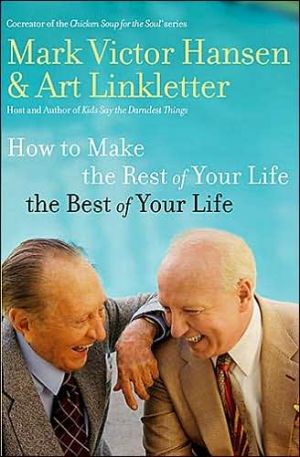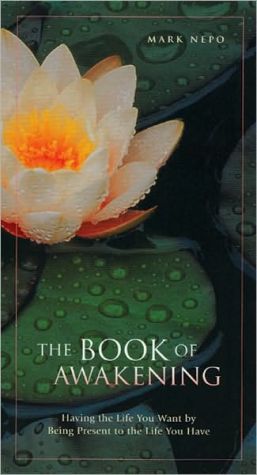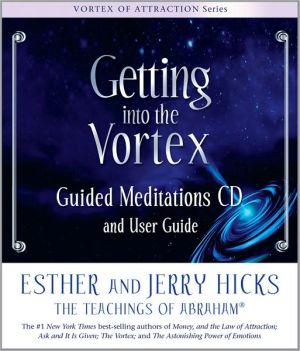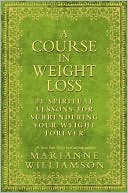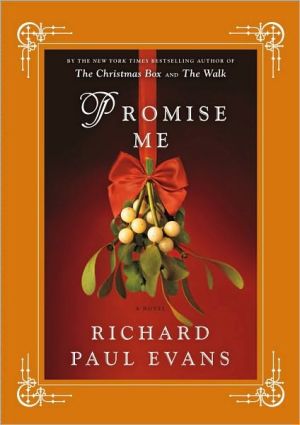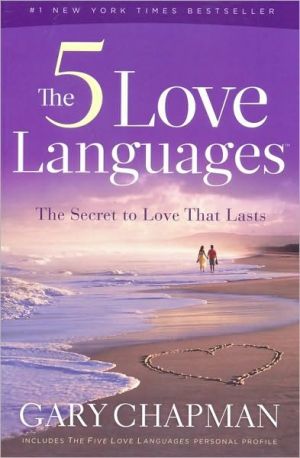How to Make the Rest of Your Life the Best of Your Life
Today we're living so much longer and more productively that age sixty has truly become the new age forty-the prime of life when our careers are in full swing, our minds are at their most creative, and our passion burn their hottest. So how do we ensure that our bodies remain fit, our minds alert and creative, and our finances stable-even growing-throughout our senior years? Television icon Art Linkletter (incredibly active in several enterprises at the age of 94) and Chicken Soup for the...
Search in google:
Baby Boomer AlertGet ready for the next prime of your life!Today we're living so much longer and more productively that age sixty has truly become the new age forty-the prime of life when our careers are in full swing, our minds are at their most creative, and our passions burn their hottest. -Mark Victor Hansen and Art LinkletterSo how do we ensure that our bodies remain fit, our minds alert and creative, our finances stable-even growing-throughout our senior years? TV icon Art Linkletter (incredibly active in several enterprises at the age of 94) and Chicken Soup for the Soul cocreator Mark Victor Hansen team up to show us how.Much more than a pep talk about maintaining a youthful attitude in our Second Prime, How to Make the Rest of Your Life the Best of Your Life provides tools we can use: strategies, self-tests, worksheets and resources, plus dozens of inspiring stories and humorous anecdotes. Woven together by the authors' own invincible spirits, these empowering principles come alive as Hansen and Linkletter motivate us to find greater purpose and passion in what we do, making the rest of our lives the best ever.
How to Make the Rest of Your Life the Best of Your Life\ \ By Mark Victor Hansen Art Linkletter \ Nelson Books\ Copyright © 2007 Mark Victor Hansen and Art Linkletter\ All right reserved.\ ISBN: 978-0-7852-1890-6 \ \ \ \ Chapter One\ The Eight Great Myths About Growing Old \ Years ago we discovered the exact point, the dead center of middle age. It occurs when you are too young to take up golf and too old to rush up to the net. -Franklin P. Adams\ We live in deeds, not years; in thoughts, not breaths; In feelings, not in figures on a dial. We should count time by heart-throbs. He most lives Who thinks most, feels the noblest, acts the best ... Life's but a means unto an end; that end, Beginning, mean, and end to all things-God. -Philip James Bailey\ In 2003, Art Linkletter, who has known every American president since FDR, administered his famous Old Geezer Test to one George W. Bush.\ "We were standing in the Oval Office. I was in Washington to get the Humanities Award, and I asked to meet with President Bush privately. We're sitting around and talking about all the things I'm doing, and he says, 'I can't believe at ninety-one you do all these things. I hope when I'm ninety-one I'll be living that way, with the same vitality, curiosity, and enthusiasm.' And I said, 'Would you like me to give you a test? Based on a UCLA study proving that lifestyle is more important than genes, we believe you can live longer no matter what your genes say.' He says, 'Go ahead. Let's see how I make out.' So I'm standing there with the president of the United States, and I start firing questions at him: Do you smoke? No. Are you abusing alcohol? No. Do you get eight hours of sleep? Not quite. That's understandable for a man with a high-stress job.\ "I went down the list. Low-fat diet. Exercise. Good breakfast. Humor. Curiosity. A passion for what you do. A happy marriage. All these things add to your life because they cut down on stress. He gave good answers, and at the end I said, 'Mr. President, you passed the test. I now proclaim you an honorary Old Geezer.' He laughed. It was probably the first time in the history of the presidency of the United States that the president had an examination on how to get older better, and I gave it to him."\ Three elderly men are at the doctor's office for a memory test. The doctor asks the first man, "What is three times three?" "274" is his reply.\ The doctor rolls his eyes and looks up at the ceiling and says to the second man, "It's your turn. What is three times three?" "Tuesday," replies the second man.\ The doctor shakes his head sadly then asks the third man, "Okay, your turn. What's three times three?" "Nine," says the third man.\ "That's great!" says the doctor. "How did you get that?" "Simple," he says, "just subtract 274 from Tuesday."\ It's Not Dying, But Living Old That Scares Us\ You don't find many folks aspiring to become Old Geezers. They are either spending fortunes in a fruitless search for potions that will keep them eternally young, or they are hustling themselves toward the grave in the hope that their bodies will call it quits before they end up broke and in a home somewhere waiting in vain for a grandchild to visit.\ In other words, they buy into the eight great myths about growing old. According to a USA Today/ABC News poll of 1,000 adults taken in 2005, the average age people want to live to is eighty-seven. Just 25 percent of those surveyed said they wanted to make it to one hundred. And what did the same group cite as their main reason for not wanting to live to 100, 120, or beyond? Being disabled by health problems and becoming a burden to their loved ones.\ Baby Boomers say they fear death less than they fear the idea of falling apart when they hit old age. The specter of spending ten, twenty, or thirty years immobile, bereft of memory and identity, and utterly dependent taps the deepest fears of today's active, vibrant Boomers, and who can blame them? Compared to that kind of life, death looks like a viable alternative.\ Those grim images of old age are outdated. Today, seniors compete in world-class Olympic events, run ultramarathons, start and manage billion-dollar companies, publish bestsellers, climb Himalayas, act, sing, dance, travel to the farthest corners of the world, and make breakthrough discoveries in medicine, science, history, geriatrics, and human sexuality. People over fifty have broken the tape into the twenty-first century with vigor, but our concepts about what it means to be old are languishing in the nineteenth century. It's time they caught up.\ Where We Were Then, Where We Are Now\ In case you think this is all a lot of hype, witness some of the more remarkable examples of older people who are not just getting by but are at the top of their games:\ Clint Eastwood, 76, won his second Academy Award for Best Picture at age 75.\ Paul Newman, 80, remains a race car driver and a leading producer of natural foods, much of the profits from which he donates to charities.\ Sophia Loren, 71, continues to make films regularly in her native Italy and is widely regarded as one of the world's great timeless beauties.\ John Wooden, 95, former UCLA basketball coaching legend, continues to travel the country speaking to audiences about his Pyramid of Success.\ Sandra Day O'Connor, 75, was widely regarded as the most influential justice on the Supreme Court of which she was recently a member.\ Warren Buffett, 75, known as the "Oracle of Omaha," is one of the world's wealthiest men, the champion of value investors, and the leading mind in smart, risk-managed investing.\ Paul Harvey, 87, continues to tell listeners the "rest of the story" and wish us all "good day" on radio stations throughout the US and around the world.\ Etta James, 68, is one of the most vibrant, virtuoso female blues singers in the world and performs at dozens of blues festivals annually.\ Chita Rivera, 73, still regarded as "The Goddess of Broadway," continues to tour and perform, singing and dancing all over the nation.\ Betty Ford, 88, has become synonymous with drug rehabilitation and persists in her crusade to find new ways to prevent and treat drug abuse.\ Those are just a few examples of well-known people who are leading the way in their professions at ages that, a few decades ago, would have gotten them laughed into the rest home. Society's acceptance of what seniors can accomplish has undergone a marvelous transformation. We don't even blink today when a seventy-year-old launches a new Internet company, sets a record in the discus throw, or releases a hit music CD. The younger generation takes it for granted now that older Americans will live longer, be healthier, get more active, and achieve more in their later years than ever before. The only problem is the older Americans themselves still don't get it.\ In 1903, the average US life expectancy was forty-seven years. Today, according to the Centers for Disease Control and Prevention, the average US citizen can expect to live just over seventy-seven years as of 2004. And people in some other cultures, such as Okinawa and Sardinia, are living even longer. What's even more surprising is the increase in the number of centenarians-those over one hundred. According to the US Census Bureau, there are more than 71,000 Americans over age one hundred today, with that number expected to boom to 241,000 by 2020. We owe that in part to improved health care, medicines, public sanitation, and better nutrition. But millions have access to those things, and only a small percentage of us live to triple digits. What do they know that we don't?\ The Art Linkletter "Old Geezer Test"\ Are you a future Old Geezer? Answer the questions to find out, then check your score at the bottom.\ 1. Do you refrain from smoking? YES / NO 2. Do you abstain from alcohol consumption? YES / NO 3. Do you get eight hours of sleep a night? YES / NO 4. Do you eat a low-fat diet? YES / NO 5. Do you exercise every day? YES / NO 6. Do you eat a good breakfast every day? YES / NO 7. Do you have a sense of humor? YES / NO 8. Do you have a sense of curiosity about the world? YES / NO 9. Do you have a passion for what you do? YES / NO 10. Do you have a happy marriage? YES / NO\ Scoring-Count your "Yes" answers and determine your odds of becoming an Old Geezer.\ 9-10 "Yes" answers: You are well on your way to Old Geezerhood, if you're not there already.\ 6-8 "Yes" answers: You're a good candidate to become a Geezer, but you've got some work to do in a few areas.\ 3-5 "Yes" answers: You're not maintaining the best habits to keep you vital as you age. Old Geezerhood is going to take some work and commitment.\ 0-2 "Yes" answers: You have a will, right?\ Aging Fearlessly\ Today's super-old refuse to accept the idea that age-related losses of health, mental clarity, mobility, passion, and purpose are inevitable. Aging and decline, for now, are inevitable (though medical and scientific research are now challenging even that long-held belief), but they can come at the end of eight or nine or ten decades of healthy, vigorous, fulfilling living. We're not talking about denying aging or chasing some nonexistent fountain of youth but about extending healthy life by years or even decades.\ The people who will make the rest of their lives the best of their lives are those who stubbornly refuse to believe that life is a one-way slide into dissolution once you pass age sixty. These people-you're one of them-look at aging fearlessly, as a time when adult life is just entering its second half. You've made your money, had your kids, made your sacrifices, earned your wisdom. Now it's time to travel, build, eat, drink, dream, create, speak truth, cherish friends, learn from past mistakes, make all new mistakes, take risks, make peace with the things you cannot change, and raise Cain over the things that need changing. As Norman Lear, creator of such television icons as All in the Family, said in an interview for this book, "'Next' is more important than 'Over.'"\ As aging expert Dr. Ken Dychtwald stated in an extensive interview for this book, "We are witnessing the emergence of a gerontocracy, a powerful new old age. And we have the largest generation in American history barreling toward it." More than any other time in history, you have the power to take your place in that gerontocracy. It all begins with understanding the Eight Myths and how to defy them.\ A husband and wife, both sixty years old, were celebrating their thirty-fifth anniversary. During their party, a fairy appeared to congratulate them and grant them each one wish. The wife wanted to travel around the world.\ The fairy waved her wand and poof!-the wife had tickets in her hand for a world cruise. Next, the fairy asked the husband what he wanted. He said, "I wish I had a wife thirty years younger than me."\ So the fairy picked up her wand and poof!-the husband was ninety.\ [Myth #1: Sickness\ According to the conventional wisdom, old age means a breakdown of the body's systems. But advances in science and new discoveries about the power of lifestyle changes mean that age does not have to be a time of constant sickness and diminishing health. Only about 5 percent of seniors today live in nursing homes.\ As with so much related to health, avoiding sickness in old age comes down to prevention. Most of the diseases that disable or kill older Americans-heart disease, stroke, cancer, diabetes-are in large part the result of lifestyles that include too much bad food, too little exercise, excessive stress, lack of rest, and killer habits such as smoking and drinking. By the same token, the factors that extend healthy life are also matters of lifestyle: eating lots of fresh fruits, vegetables, whole grains and nuts, getting plenty of regular exercise (including playing sports), drinking enough water, and so on. The problem is, it seems that many Americans lack the foresight to understand that doing these things when they're fifty can keep them living well at eighty.\ "Sadly, too much of modern medicine appears to still be driven by the pharmaceutical industry and the sickness model and does not concern itself with health, energy, and vitality," wrote Australian antiaging physician Dr. Michael Elstein, author of Eternal Health, in response to questions for this book. "Many doctors are ignorant when it comes to matters of wellness, largely because they are unhealthy themselves." Worse, what some call the "harmaceutical" industry is now focused on selling "continuity" drugs that you take forever. We remember when you took a drug for a week, got better, and stopped taking it.\ In other words, sickness is as much a matter of the culture in our society as of the culture of bacteria. If you're waiting to become ill before taking action, you're going to be sick.\ An Ounce of Prevention ... Your vital organs, especially your kidneys, become less efficient with age (healing massage may help). Your metabolism slows down. Your vision and hearing become less acute (though some claim the Bates method may help prevent some sight impairment; learn more at http://en.wikipedia.org/wiki/Bates_Method). These aren't surprises to anyone, but it's amazing that some people never make the changes necessary to compensate.\ The keys to avoiding chronic sickness as you age are anticipation and prevention. This is why it becomes so vital not to deny old age but to accept and embrace it as a time when your greater freedom and possibility come with a price: investing time, planning, and money in measures designed to prevent the early breakdown of your body. There are so many things you can do that might seem insignificant but have an enormous cumulative effect on your risk of disease:\ Wash your hands regularly. Just using regular soap and water (expensive antibacterial cleansers are no better, according to the FDA) reduces your risk of infection by bacterial and viral diseases. Wash your hands as long as it takes to sing "Happy Birthday."\ Regularly dust and clean bedrooms and other rooms where you spend lots of time to reduce the risk of allergic reactions, eradicate dust mites, and eliminate mold and bacteria.\ Get your annual flu vaccination, and make sure your grandchildren are vaccinated for pneumonia. Recent studies show that when children and infants are vaccinated against pneumonia, deaths among seniors from the disease drop dramatically.\ Talk to your physician about an "aspirin a day" regimen. It purportedly thins blood clots and thereby helps prevent strokes, aneurisms, and heart attacks.\ Get an annual checkup, even if you feel perfect. Men over fifty should always have a prostate exam, and everyone over fifty should have a colonoscopy at least every five years, more often if you are at higher risk.\ As Elstein points out, today there is a remarkable battery of tests that measure risk factors for heart disease and other killer diseases: CT scans, glucose metabolism tests, "biological terrain assessments" that measure free radical levels, cellular acid/alkali balance, inflammatory levels, and more. Today's advanced diagnostic tools can detect the root causes and inform the treatment of illnesses years before they cause symptoms.\ Wellness Insurance? You may be familiar with "wellness medicine," a collection of alternative therapies ranging from chiropractic to therapeutic massage. These types of health care focus less on treating illness than on reducing stress and getting the body in an optimal state to fight off illness and maximize overall health. Many Baby Boomers who came of age in the 1960s, and are big proponents of alternative care, still rely on wellness providers to help them stave off the ailments of old age. In fact, we invest three times as much on alternative therapies as we do traditional medicine.\ (Continues...)\ \ \ \ \ Excerpted from How to Make the Rest of Your Life the Best of Your Life by Mark Victor Hansen Art Linkletter Copyright © 2007 by Mark Victor Hansen and Art Linkletter. Excerpted by permission.\ All rights reserved. No part of this excerpt may be reproduced or reprinted without permission in writing from the publisher.\ Excerpts are provided by Dial-A-Book Inc. solely for the personal use of visitors to this web site. \ \
Foreword Art Linkletter xiiiForeword Mark Victor Hansen xviiIntroduction: Forget Entitlements-Introducing the Ten Empowerments 1It's Not "How Old Are You?" But "How Are You Old?"The Eight Great Myths About Growing Old 19Final Score: Lifestyle 70, Genes 30 48It's Who You Know 67You Can't Turn Back the Clock, But You Can Rewind ItWork and Money or The Only Thing You Should Re-Tire Is Your Car 87Body or Never Let Anyone Help You Out of a Chair 115Mind or Are You "Sageing" or Aging? 153Sex or Still Enjoying It While Everybody Else Is Just Talking About It 179Spirituality or Plugging Into a Higher Power 194Attitude or Be Regretless 210Creativity or What's Grandma Moses Got That You Ain't Got? 228Purpose or They Don't Need Preachers in Heaven 248Age Is Wasted on the Old 261Second Prime Resources 277Glossary of Second Prime Terms 283Notes 285About the Authors 297
\ From Barnes & NobleNonagenarian Art Linkletter, the host of House Party and People Are Funny, two shows that had a combined 44-year run on TV, forms a dynamic duo with Chicken Soup for the Soul co-creator Mark Victor Hansen, encouraging readers to embrace their old age.\ \
